Edie Melson's Blog, page 118
August 3, 2022
Essential Writing Activities that Aren't Actually Writing
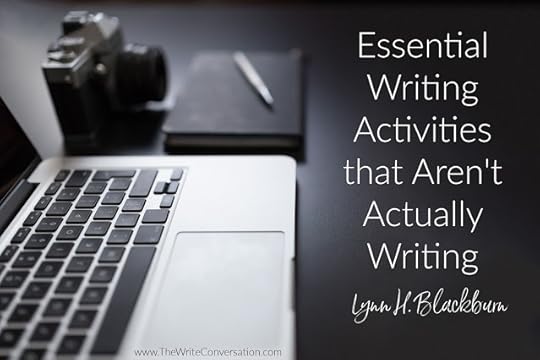
by Lynn H. Blackburn @LynnHBlackburn
If I say that something is writing adjacent, do you know what I’m talking about? These are the activities that writers do that support their writing, but that are not, in fact, writing.
There is a tendency to consider time spent on writing adjacent projects as time wasted. I’ve been guilty of thinking that myself. Of assuming that every spare minute of my life needed to be spent writing—BICHOK, Butt in Chair, Hands on Keyboard—because everything else was a waste of time.
But I have changed my tune, friends. Because I’ve learned something about myself and my writing process, and one of the things I’ve learned is that my brain needs some of these things that I previously labeled as “time sucks” or “procrastination stations.”
That’s right. I said need. Not want. Not “might be a good idea.” Need.
Now, here’s where it gets tricky. It turns out that some of the things I need to do to refill my well, to fuel my creativity, to light a fire under my muse? These are things that I love doing. Things I do for fun. Things that don’t feel like work at all, because to me, they aren’t. And because I enjoy them so much, I felt guilty when I indulged in them rather than writing. Not because the things I love doing are bad things, but because the time spent on them is time I could have been writing.
And—I might be about to step on some toes here—I felt guilty because at some point in my writing journey, someone told me that many writing-adjacent activities were frivolous and while they might be fun, they had to be sacrificed if I wanted to have a writing career. That these things were only to be enjoyed when the work was done, the words were on the page, and the deadline was met.
When, for me, it turns out that some of those writing adjacent projects aren’t so much writing adjacent as they are writing essential. They help me get words on the page because they give my conscious brain time to disengage from the story while my subconscious is hard at work. Then when I sit down to write, the words flow.
So today I’m going to share a handful of my essential writing adjacent activities. There’s an excellent chance that what works for me will not work for you, but hopefully this will give you a place to start if you need to spend some time refilling and refueling.
Lynn’s Essential Writing Adjacent Activities
1. Reading. Y’all. I have spent a lot of years feeling guilty for reading while on a deadline. Because even when I tried not to, I wouldn’t be able to resist forever and I’d read a book, feeling guilty the whole time, without understanding that it was giving me necessary fuel for my creativity. This doesn’t mean I get to read all day every day, but I have put reading back up in the priority spot where it belongs in my life. I was a reader before I was a writer, and I don’t write well when I’m not fueling my mind with stories.
2. Pinterest/Idea boards. I do these on Pinterest. You could do them on your computer or on an actual wall in your house. I can fall down a rabbit hole and happily spend hours creating idea boards for my books. This is something that typically happens very early on when I’m creating the characters and developing the story. I post pictures of quotes that relate to the characters and of celebrities who resemble my characters. I save images that relate to specific scenes or to the general aesthetic of the book. What I’ve learned is that this process helps me get into my characters’ heads and when I sit down to write, I have more material to make them come alive on the page.
3. Playlists. This is something I’ve only recently begun dabbling in, but I love it and I’m doing it more and more. I use Spotify, but any music streaming platform would work. I love music and I typically listen to film scores/soundtracks while writing. But I’ve had a blast choosing songs to add to book-specific playlists. Songs are powerful, focused stories told in the space of a few minutes, and for me it’s usually the emotion they evoke that is what I find so inspiring. Sometimes it’s one particular lyric that resonates. Then, when I’m on the road or doing chores around the house, I can fire up that playlist and it gives my subconscious more of what it needs to help me find the right words when I make it back to my computer.
There are more: Knitting, crochet, exercise, cooking, entertaining, watching live theater, movies, television, getting out in nature. All of these activities not only enhance my overall wellbeing, but they also provide inspiration.
So, this month, maybe cut yourself some slack! Read
a book. Spend some time on a craft you love. Watch a movie. Then see how you feel when you sit down at your computer. It could be that your favorite writing adjacent activities are just what you need too!
Grace and peace,

TWEETABLEEssential Writing Activities That Aren't Actually Writing, insight from author @LynnHBlackburn on @EdieMelson (Click to Tweet)
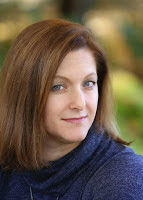 Lynn H. Blackburn loves writing romantic suspense because her childhood fantasy was to become a spy, but her grown-up reality is that she's a huge chicken and would have been caught on her first mission. She prefers to live vicariously through her characters and loves putting them into all kinds of terrifying situations while she's sitting at home safe and sound in her pajamas!
Lynn H. Blackburn loves writing romantic suspense because her childhood fantasy was to become a spy, but her grown-up reality is that she's a huge chicken and would have been caught on her first mission. She prefers to live vicariously through her characters and loves putting them into all kinds of terrifying situations while she's sitting at home safe and sound in her pajamas! Unknown Threat, the first book in her Defend and Protect series, was a 2021 Christy Award finalist and her previous titles have won the Carol Award, the Selah Award, and the Faith, Hope, and Love Reader’s Choice Award. Malicious Intent, the second book in the series, released March 2022.
She is a frequent conference speaker and has taught writers all over the country. Lynn lives in South Carolina with her true love and their three children. You can follow her real life happily ever after by signing up for her newsletter at LYNNHBLACKBURN.COMand @LynnHBlackburn on BOOKBUB, FACEBOOK, TWITTER, PINTEREST, and INSTAGRAM.
Published on August 03, 2022 22:00
August 2, 2022
Your Readers Will Love the Characters You Create with These Tips

by Sarah Sally Hamer @SarahSallyHamer
Finding the Fatal Flaw in Your Characters
Every character has a fatal flaw, or a trait that will ultimately get the character into trouble. Why? Because perfect characters don’t exist. Or at least we don’t write stories about them. Imagine how tedious it would be to write (or read!) about a character who never fails, who never does anything wrong, who never has to change. Boring!
Instead, we want characters who struggle with life. And fail, sometimes spectacularly! Dorothy in The Wizard of Oz failed over and over again as she learned her lessons. Toto bit the neighbor, she ran off and got caught by the tornado, she immediately kills someone important on her arrival in Oz, and so on and so on. What was her fatal flaw? She didn’t believe the world was a happy place. Everyone sing it together with me...Somewhere, over the rainbow.... She didn’t understand that she could be happy no matter WHERE she was. At least, not until she learned it from the trials and tribulations she dealt with in Oz.
In Up, Carl’s flaw was similar—life wasn’t worth living without Ellie. So nothing and no one was important to Carl, at least until he met Russell, Doug, and Kevin, who helped him change his mind. His external flaw was that he would do anything to get Ellie’s house to Paradise Falls but the internal one was about his emotional health. And he finally realized that.
I’m watching the Virgin River series right now and Mel, who is a nurse with a lot of personal issues, is another lost soul who can’t find happiness. I’m only in the first season, so I’m hoping she finds it with that cute Jack the bartender, but he has issues too. Is love the only solution to a fatal flaw? It sure can be in a romance. But they also need to deal with the baggage they carry—her a broken marriage and still-born baby, him PTSD from Iraq where he “left someone behind.”
But a character’s fatal flaw doesn’t always get fixed. In Moby Dick, Ahab’s flaw is his obsession with killing that whale. He never waivers and the reader really knows that he will die instead of give up and go home. (Of course, Ahab is not really the protagonist—Ishmael is.
Hamlet’s fatal flaw is that he suffers from paralysis of analysis. He can’t make a decision for the life of him and everything passes him by while he’s thinking. He lets his love interest die, because he’s not willing to take action.
So what is your character’s fatal flaw? What drives him or her to destruction? It can be that he wants to get rich. Or that she believes she isn’t worthy. Or that he can’t allow anyone to help him. Or that she believes that, because one marriage failed, she can’t fall in love again. Or that, if he tells the truth about his boss, he’ll get fired.
Some of these flaws are true and the character has to decide how much the truth is worth. But many of them are misunderstandings or unnecessary fears. It really doesn’t matter, as far as the flaw goes, but it will make a huge difference in how the character will handle the situation.
Of course, there are as many flaws as there are characters, so any one you choose, as long as it makes sense in the context of the story, will work. After you pick one, you’ll need to decide how the character will learn the lesson. Will the flaw destroy him or her? Or will she or he triumph over it, with bells ringing? That, of course, depends on your story.
Bottom line, the stronger the flaw, the more difficult it will be to overcome. But that’s just good fiction, right?
What flaw does your character have? Will he or she achieve success in spite of it?
TWEETABLEYour Readers Will Love the Characters You Create with These Tips from @SarahSallyHamer on @EdieMelson (Click to Tweet)
 Sarah (Sally) Hamer, B.S., MLA, is a lover of books, a teacher of writers, and a believer in a good story. Most of all, she is eternally fascinated by people and how they 'tick'. She’s passionate about helping people tell their own stories, whether through fiction or through memoir. Writing in many genres—mystery, science fiction, fantasy, romance, medieval history, non-fiction—she has won awards at both local and national levels, including two Golden Heart finals.
Sarah (Sally) Hamer, B.S., MLA, is a lover of books, a teacher of writers, and a believer in a good story. Most of all, she is eternally fascinated by people and how they 'tick'. She’s passionate about helping people tell their own stories, whether through fiction or through memoir. Writing in many genres—mystery, science fiction, fantasy, romance, medieval history, non-fiction—she has won awards at both local and national levels, including two Golden Heart finals.A teacher of memoir, beginning and advanced creative fiction writing, and screenwriting at Louisiana State University in Shreveport for almost twenty years, she also teaches online for Margie Lawson at WWW.MARGIELAWSON.COM. Sally is a free-lance editor and book coach at Touch Not the Cat Books, with many of her students and clients becoming successful, award-winning authors.
You can find her at hamerse@bellsouth.net or WWW.SALLYHAMER.BLOGSPOT.COM
From Sally: I wish to express gratitude to the giants upon whose shoulders I stand and who taught me so much about the writing craft. I would list every one, if it were only possible.
Published on August 02, 2022 22:00
August 1, 2022
Tips for Writers Dig Deep to Create More Compelling Characters in Your Story

by PeggySue Wells @PeggySueWells
The more a writer knows the personality, background, and motivations about a character, the more compelling the story.
A story is a snapshot of a character’s life, the noteworthy parts with the boring aspects conveniently trimmed away. Much about your character will not be included. But like a house that is built on a foundation not visible, the structure underneath determines a good deal about how the visible part responds to good and tough situations.
The same is true about character building. Each character has their own backstory, those unique settings and events that mold the interior and exterior of a person to be their own complex individual.
Last month we focused on the the earliest foundation by asking questions about the character’s beginnings. From the circumstances surrounding conception and birth until childhood begins to transition into adulthood, we did a deep dive into those formative childhood years. The next stage of personality development includes the middle and high school grades.
Some stories focus on the young adult season. Harry Potter is a coming-of-age adventure from childhood until high school graduation.Twilight covers the high school yearsThe Michael Vey series features characters venturing through young adulthood.C.S. Lewis set his young adult characters to explore Narnia.
Here are three methods and questions to help you develop your character’s backstory during those pivotal years after childhood.
1. Much like a psychologist, an author can ask probing questions that create a whole personality. When did puberty begin? Sexual awareness? Who was the character’s first crush? First romance? What adults populated your character’s world? Who were the parental surrogates such as coaches or teachers? As a teenager, when did your character separate from parents or from the place considered to be home? What was their first work experience? First job? What events contributed to the character’s unique sense of self? How did unresolved issues from childhood impact the following years? What moods were typical? Was the character interested in learning or close-minded?What did education look like when your character was an early adult? When did a career come into play? Was there relocation? Separation from family? What hopes and dreams did your character harbor? What was accomplished? What frustrations or roadblocks prevented longed-for accomplishments? How did the character respond to culture? What habits were developed? Did the character experience sexual relationships, love relationships, or have children? Who were major influences during this period?As an adult: What is your character’s occupation and salary? Does the character practice faith? What type of people have become friends?Is family still involved? What hobbies, interests, and political views occupy their attention?
Whatever the age of your character in story, consider their inner appearance.What is your character afraid of? What is the worst thing that can happen? What have been the character’s hardest emotions? Happiest? What triggers anger? When anger is triggered, how is that powerful emotion expressed? What does this character detest? Not understand? What is embarrassing? What is an inner-strength?How does the character receive and give love?
Perhaps most importantly: What does your character want most of all? What lies does the character believe? What secret does the character keep? How does the character see themself?
Another way to know your character is to interview them as you would for someone you are writing a feature article about.What would you ask your character?How does your character answer the interview questions? What do you observe about your character?What are your character’s actions, habits, behaviors?How does your character interact in their environment?
3) A third way to dive deeply into the person you are creating is to do a personality test for your character. There are a number of personality assessments online from the usual Myers-Briggs to the Enneagram.
Writing characters is a study on what people do and why they do it.
Once you know your character’s background, rather than an information dump, drip this pertinent information about your character to the reader as needed for this story. Some information is only for the author to know the character well enough to write believably. Other information will be key for the reader to know … eventually.
TWEETABLETips for Writers: Dig Deep to Create More Compelling Characters in Your Story, insight from author @PeggySueWells on @EdieMelson (Click to Tweet)
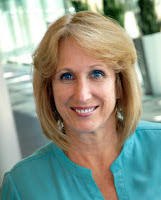 Tropical island votary and history buff, PeggySue Wells parasails, skydives, snorkels, scuba dives, and has taken (but not passed) pilot training. Writing from the 100-Acre Wood in Indiana, Wells is the bestselling author of thirty books including The Slave Across the Street, Slavery in the Land of the Free, Bonding With Your Child Through Boundaries, Homeless for the Holidays, Chasing Sunrise, and The Ten Best Decisions A Single Mom Can Make. Founder of SingleMomCircle.com, PeggySue is named for the Buddy Holly song with the great drumbeat. At school author visits, she teaches students the secrets to writing and speaks at events and conferences. Connect with her at www.PeggySueWells.com, on Facebook at PeggySue Wells, and LinkedIn at linkedin.com/in/peggysuewells
Tropical island votary and history buff, PeggySue Wells parasails, skydives, snorkels, scuba dives, and has taken (but not passed) pilot training. Writing from the 100-Acre Wood in Indiana, Wells is the bestselling author of thirty books including The Slave Across the Street, Slavery in the Land of the Free, Bonding With Your Child Through Boundaries, Homeless for the Holidays, Chasing Sunrise, and The Ten Best Decisions A Single Mom Can Make. Founder of SingleMomCircle.com, PeggySue is named for the Buddy Holly song with the great drumbeat. At school author visits, she teaches students the secrets to writing and speaks at events and conferences. Connect with her at www.PeggySueWells.com, on Facebook at PeggySue Wells, and LinkedIn at linkedin.com/in/peggysuewells
Published on August 01, 2022 22:00
July 31, 2022
How to Manage the Waiting Part Our Writing Journey

by Kristen Hogrefe Parnell @KHogrefeParnell
As I’m writing this post, I’m eight months pregnant. Our active little boy is transforming my belly into a wave pool, and I’m gingerly massaging his foot to encourage him to stop poking my ribs.
This miracle of life is due shortly after you’ll be reading these words. He is an answer to my husband’s and my prayers, and it’s been a journey to get to this place. Our son is a beautiful example of the truth that good things take time, and that timing is something God controls, not us.
The same can often be said about our writing journeys. We might feel “ready” to pitch that project or receive that long-sought contract, but instead, maybe an editor or agent tells us our proposal isn’t ready or the dreaded rejection email lands in our inbox instead.
Today, I want to share some perspective on the wait, because friend, I’ve been there, and I’ll be there again. Waiting is one of the waves of life we can either learn to ride or let it crash over us. Be encouraged to ride it well.
The Wait in the Writing
#1: Redeem the time during the waitWhen I was waiting to get pregnant, I kept up my practice of going to the gym and running several times a week to stay in my best shape. I read books on optimal diet and purged makeup that wasn’t considered pregnancy safe. In short, I wanted my body to be the best place I could offer my baby when that day came.
As writers, we need to make the most of the waiting too. Ask yourself: How can I best use my “in-between” time? Maybe it’s diving right into the research and writing of your next book. Maybe it’s reading books on building your platform or books on craft. Maybe now is the time to give your website that facelift it needs or seek out guest opportunities on blogs and podcasts. The waiting can be a rich season of development and progress if we have the right mindset.
#2: Practice celebration for others Being grateful for what you have while wanting something else is not easy. When I was waiting to get pregnant, many of my friends were sharing pregnancy announcements. It felt as though everyone was getting pregnant but me. I decided that celebrating their good news was a much happier alternative to self-pity.
When we’re waiting on a book contract of our own, it may seem as if every Facebook friend of ours is announcing a book deal, agent signing, or new release. Resist the temptation to compare or covet, friend, because it will only eat you from the inside out. Instead, celebrate with them! Go a step beyond that by sharing their good news, buying their book when it’s available, and reviewing it.
#3: Remember God has good plans for youIf there’s one lesson I’ve learned in this life, it’s that God writes our stories differently and better than we ever could. His timing doesn’t follow our calendars, and His answers to prayer often don’t look anything like our original requests.
Thank God. If He gave us what we asked for when we asked for it, we would miss out on His best. As Isaiah 30:18 says, “Therefore the Lord will wait, that He may be gracious to you; And therefore He will be exalted, that He may have mercy on you. For the Lord is a God of justice; Blessed are all those who wait for Him” (NKJV).
Remember, good things take time. How can you make the most of your current season?
TWEETABLEHow to Manage the Waiting Part Our Writing Journey, 3 tips from @KHogrefeParnell on @EdieMelson (Click to Tweet)
 Kristen Hogrefe Parnell writes suspenseful fiction from a faith perspective for teens and adults. Her own suspense story involved waiting on God into her thirties to meet her husband, and she desires to keep embracing God’s plan for her life when it’s not what she expects. She also teaches English online and is an inspirational speaker for schools, churches, and podcasts. Her young adult dystopian novels, The Revisionary and The Reactionary, both won the Selah for speculative fiction, and her first romantic suspense novel with Mountain Brook Ink releases this December. Kristen and her husband live in Florida and are excited to welcome their first baby in August. Connect with her at KristenHogrefeParnell.com.
Kristen Hogrefe Parnell writes suspenseful fiction from a faith perspective for teens and adults. Her own suspense story involved waiting on God into her thirties to meet her husband, and she desires to keep embracing God’s plan for her life when it’s not what she expects. She also teaches English online and is an inspirational speaker for schools, churches, and podcasts. Her young adult dystopian novels, The Revisionary and The Reactionary, both won the Selah for speculative fiction, and her first romantic suspense novel with Mountain Brook Ink releases this December. Kristen and her husband live in Florida and are excited to welcome their first baby in August. Connect with her at KristenHogrefeParnell.com.Featured Image: Photo by Denys Argyriou on Unsplash
Published on July 31, 2022 22:00
July 30, 2022
Living Life to its Top—Each Day—Makes Us Better Writers

by Craig von Buseck @CraigVonBuseck
“That the joy of life is living, is to put out all one’s powers as far as they will go. … We have shared the incommunicable experience of war; we have felt, we still feel, the passion of life to its top.”
Oliver Wendell Holmes, one of America’s most famous Supreme Court justices shared these thoughts from his experiences as a soldier in the Civil War. These poignant words were part of a moving speech thirty years later in a Memorial Day address at Harvard University.
An eloquent and thoughtful presenter, Holmes was often asked to speak for Memorial Day and veterans gatherings. Ten years earlier, in a speech for the Grand Army of the Republic, Holmes made this moving declaration to his fellow veterans:
“…the generation that carried on the war has been set apart by its experience. Through our great good fortune, in our youth our hearts were touched with fire. It was given to us to learn at the outset that life is a profound and passionate thing.”
It’s fascinating to read this reminisces of Holmes in the decades after the terrible crucible of the American Civil War. A member of the 20th Massachusetts infantry regiment, Holmes spent three grueling years as a soldier. Wounded three times and enduring a nearly fatal battle with dysentery, Holmes suffered through the death and wounding of many close friends. Yet the lesson he draws from this experience is that “life is a profound and passionate thing.”
Remarkable.
Enduring as Writers
While we are not fighting a war like Holmes did, with guns and bayonets, we as writers do carry on a continuing fight in the battle of ideas—and sometimes this kind of warfare can be both exhausting and disheartening. Yet if we endure, we too can experience the profound and passionate side of life.
We can enjoy the satisfaction of knowing that we took our place at the table in the marketplace of ideas and made an impact in the public discourse. Perhaps our hard-fought labors can influence the way people think and the decisions they make—hopefully for good and for the betterment of society and civilization.
This is what John Milton meant in his famous Areopagitica when he talked about truth grappling in the forum of thought:
“Though all the winds of doctrine were let loose to play upon the earth, so Truth be in the field, we do injuriously by license and prohibit to misdoubt her strength. Let her and Falsehood grapple; whoever knew Truth put to the worse, in a free and open encounter.”
The only way for truth to be sent into battle is through the publication of ideas. That is our job, our duty, and our privilege as Christian writers and speakers.
Born For This Fight
As communicators of this truth, we have been given a tremendous gift by God—the talent to convey vision and ideas through the written word. Our verses become images in the minds of people around the world, most whom we may never meet.
Today, are you embracing each day as a gift?As a writer, are you pushing out all your “powers as far as they will go?”In and through your writing, do you “feel, the passion of life to its top?”
While the war of words may be disheartening from time-to-time, we must also embrace the exhilaration in the fight. Lives, marriages, and families are at stake. And you, as a Christian writer, were born and fashioned for this fight.
This is at the same time both a wonderful opportunity and a tremendous responsibility. As Scripture declares, “From everyone who has been given much, much will be required.” (Luke 12:48, NASB)
Embrace Each Day
Each day provides new opportunities to use this talent to influence the way people think about their world. Each day is another chance to share words of truth and hope. Each day provides us with a canvass upon which we can paint word images to reflect the light and love of Jesus.
Each day is a play in three acts: morning, afternoon, and evening.
Each day is to be cherished, for we do not know how often God will allow us to attend this theater of life.
The players can be walk-on extras, seen once or twice and then never again. Many others, however, are familiar characters, written into the script to provide drama and suspense, comedy, tragedy, anxiety, joy, and a rainbow of emotions for the enjoyment and education of the central character and the audience.
The characters also act out their parts for the purposes and pleasure of the Author—the Creator of each day. He is the One who chooses the characters, the setting, and the plot. In fact, the Author owns the theater.
Who, besides the Author, is watching this play? Who is in the audience? We are told there is standing room only for this performance. There are a great many witnesses; actors whose lives have had a successful run and who are now cheering on those still learning the trade.
Others are young thespians waiting for their time to take center stage, learning the craft from observance.
The Author wants this play to be a smash hit. He has paid the highest price to ensure its success. But only those who follow His direction and stay true to the script will receive an award-winning run.
Though it is difficult and many desire to re-write the script or change the staging, the actors who remain true to the Spirit of the Author are promised as a reward the coveted crown of life.
Sadly, there are those who try to ad-lib, leaving the script behind. At first curious crowds attend to see what the show has to offer. But theatergoers accustomed to the direction of the Author soon tire of the charade. The show soon closes and sadly the actor will never work with the Author again.
But there are also the performers willing to give it all, yielding to the direction of the Author. These are the shining lights—the chosen.
When the show has run its course, and the actor has finished the race, at the final curtain call, the thespian bows gracefully to the applause of the audience. Then he or she turns and directs the spotlight to the regal box seat reserved for the honored Author.
In one final dramatic gesture, the actor bends aa knee, removes the thespian crown and places it before the Author, the Director, the theater owner—the only One worthy to receive the praise … each day.
Watch for Craig’s new books coming this year: Telling the Truth: How to Write Narrative Nonfiction and Memoir from Bold Vision Books and Walking in Faith: The Peter, Paul, and Mary Principle from Elk Lake Publishing.
TWEETABLELiving Life to Its Top—Each Day—Makes Us Better Writers, insight from author @CraigVonBuseck on @EdieMelson (Click to Tweet)
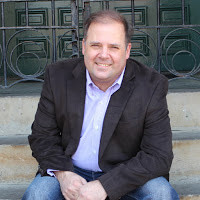 Dr. Craig von Buseck is an award-winning author, popular speaker, and the Digital Content Manager for the Parenting section of Focusonthefamily.org. More from Craig at vonbuseck.com.
Dr. Craig von Buseck is an award-winning author, popular speaker, and the Digital Content Manager for the Parenting section of Focusonthefamily.org. More from Craig at vonbuseck.com.Featured Image: Photo by Tim Trad on Unsplash
Published on July 30, 2022 22:00
July 29, 2022
To Grow as a Writer We Must Nurture Meaningful Writing Relationships

by Yvonne Ortega @YvonneOrtega1
The importance of building writing relationships is a concept Edie Melson emphasizes. At the Kentucky Christian Writers Virtual Conference June 16-18, 2022, and the SpeakUp Conference July 6-9, 2022, I experienced the value of Edie’s philosophy in three ways.
Sessions Online with Those I Built Relationships through Writing
At the virtual Kentucky CWC, Lori Hatcher had three breakout sessions and appointment slots. We follow and learn from each other on The Write Conversation. I attended Lori’s sessions. As she spoke, I realized how much we have in common:Toastmasters but not the same club Christian Communicators Conference graduates although not the same yearLove for people and the desire to offer them hope through our speaking and writingIn an appointment with Lori, we shared our love of devotional writing, prayer, and praise.
I also “met” Tracy Crump at the Kentucky CWC but had never seen her. She is a petite woman with a sense of humor that showed up when I least expected it. For example, the founder of the KCWC Jean Hall opened each day with prayer and a devotion. When she introduced one of the speakers, Jean said, “You’ll never find a kinder person.” Tracy wrote in the live chat, “I’m much kinder.”
Her love and compassion for caregivers overflow on her beautiful new website. which AWSA sister Rhonda Dragomir designed at http://tracycrump.com/
Reunions at the SpeakUp Conference with Those I Built Relationships at Blue Ridge
Years ago, Bethany Jett and Vincent B Davis II did an in-person breakout session at Blue Ridge—hers on marketing and PR and his on the use of Amazon to build a platform. I worked with both. Bethany shared her specialty with the Virtual AWSA Inner Circle mastermind group. So did Vincent on a separate occasion. I looked forward to seeing them again in person.
Bethany, Vincent, and I greeted one another as longtime family. We asked about spouses, pets, and general health. In our conversation, Edie’s philosophy about building relationships came to mind.
Bold Vision Books owners Karen and George Porter travel to conferences around the country. I attended Karen’s sessions on Great Storytelling and Uncover the Humor at a live AWSA event. Although I didn’t meet them at Blue Ridge, I associate them with it because they publish Edie’s books.
I refer to the Porters as “the honeymooners.” Who else would celebrate their anniversary at a conference? They fill my heart with joy as George pulls out a chair or opens a door for Karen and puts on his cowboy hat to get something for Karen from their vehicle.
Time with Those Who Understand the Schedule of Speakers and Writers
The schedule of speakers and writers means lots of time alone to prepare oral and written presentations and PowerPoint slides. During the pre-conference clinic on book proposals, AWSA sisters Kim de Blecourt and Kathy Bruins brought up the issue of time alone or with people who consider us weird. We admit we get excited over the right word for a sentence or the perfect background for a PP slide. However, those who don’t understand us experience an adrenalin rush over sports or another activity about which I lack interest.
Cindy (Lucinda) Secrest McDowell regularly contributes to The Write Conversation and mentors speakers and writers. We’ve crossed paths in person and online through AWSA and other events. When she prays, she fills me with soul strength.
And Carol Kent, the founder and executive director of the SpeakUp Conference, is a founding member of AWSA.
I encourage you to build relationships. I started with AWSA and the Write Conversation. I omitted countless people from this article for brevity. I’d be happy to speak for your organization on relationships and the power of prayer, which made the SpeakUp Conference a foretaste of heaven.
Please share how you build relationships in the comments section below.
TWEETABLETo Grow as a Writer We Must Nurture Meaningful Writing Relationships, insight from @YvonneOrtega1 on @EdieMelson (Click to Tweet)
 Yvonne Ortega walks with a small footprint but leaves a giant imprint in people’s lives. This power-packed package is a professional speaker and the author of the Moving from Broken to Beautiful® Series through cancer, divorce, forgiveness, and loss. Learn more at WWW.YVONNEORTEGA.COM
Yvonne Ortega walks with a small footprint but leaves a giant imprint in people’s lives. This power-packed package is a professional speaker and the author of the Moving from Broken to Beautiful® Series through cancer, divorce, forgiveness, and loss. Learn more at WWW.YVONNEORTEGA.COMYvonne speaks with honesty and humor as she shares her life and struggles through presentations that empower women to find peace, power, and purpose through God’s Word.
Yvonne’s background as a licensed professional counselor brings a unique perspective into the heart of women. She’s a speaking and writing coach and the owner of Moving from Broken to Beautiful®, LLC. She belongs to the Advanced Writers and Speakers Association, the Christian Authors Network, the National Speakers Association, and Toastmasters International.
She celebrates life at the beach, where she walks, builds sand castles, blows bubbles, and dances.
Featured Image: Photo by LinkedIn Sales Solutions on Unsplash
Published on July 29, 2022 22:00
July 28, 2022
The Things We Think Have a Powerful Impact on Our Writing Lives

by MaryAnn Diorio @DrMaryAnnDiorio
Scripture teaches us in Proverbs 23:7 NKJV that "as a man thinks in his heart, so is he." Let's unpack this verse to glean some of its rich treasure and apply it to our writing life.
While in context, the verse refers to having dinner with a hypocritical ruler who is saying one thing but thinking another, it can also be interpreted to mean that the way we think is the way we will be. Consider this closely related verse: "Guard your heart above all else, for it determines the course of your life" (Proverbs 4:23 NLT).
The heart is the core of our being. As Scripture says, it determines the course of our lives. This means that as our heart goes, so goes our life.
And so goes our writing life.
The heart is the seat of our beliefs, whether about ourselves, in general, or about our writing, in particular. Often those beliefs are contrary to God's Word, even though we may not be aware of the contradiction. False beliefs usually have their root in childhood experiences and are usually buried deep within the subconscious mind. As a result, we do not recognize them as false beliefs and as hindrances to our success in life and in writing.
For example, a person called by God to write for Him may shun the call because his heart tells him he will fail. In such an instance, the person is allowing a false mindset to dominate his thinking. That false mindset is the mindset of fear. It is a mindset that will hinder the fulfillment of God's call on his life.
The Bible has much to say about mindset, or how we think. One well-known passage is Romans 12:2 NKJV: "And do not be conformed to this world, but be transformed by the renewing of your mind, that you may prove what is that good and acceptable and perfect will of God." Three key points that especially apply to us writers stand out in this verse. Let's briefly consider each one.
3 Key Points to Consider about Thoughts and Writing
Point #1Do not be conformed to this world. In other words, do not think as the world thinks nor act as the world acts. Ever since the fall of man, the world has been in conflict with God. To think and act like the world, therefore, is to put ourselves in conflict with God. This will result only in suffering and ultimate destruction.
So, how do worldly writers think and act? They think greed, lust, jealousy, and envy, and they act selfishly by backbiting, criticizing, and pushing their own agenda without any thought of the harmful effect of their actions on fellow writers.
How do Godly writers think and act? They think purity of heart, generosity, love, and selflessness toward fellow writers. They rejoice at their success and promote their work above their own. They encourage fellow writers and purchase their books.
Point #2Be transformed by renewing your mind. Here the Word tells us that when we change our thinking, we change our lives. Change comes about only by a change in thinking.
But it's not just a change to any kind of thinking. It's a change to thinking according to God's Word.
Point #3Prove (or experience) the will of God. The two previous points show us how to know and experience God's will. When we refuse to think and act as the world thinks and acts, and when we change our thinking to align with God's Word and act on it, then and only then will we experience God's will for our lives--and for our writing lives.
So, dear friend and fellow writer, if you need a change in your life or in your writing, or if you are trying to figure out God's will for your life or your writing, ask yourself the following two questions:1) Am I thinking or acting like the world in any way? Holy Spirit will reveal this to us if we ask. 2) Am I changing my thinking to agree with God's Word? This, of course, requires diligent study of the Bible to know what it says.
As we obey God's command to cease conforming to this world and to renew our minds according to His Word, the truth of 1 Corinthians 2: 16 will manifest in our lives: "We have the mind of Christ."
And that is the only mindset that will bring victory to our lives and to our writing.
TWEETABLEThe Things We Think Have a Powerful Impact on Our Writing Lives, insight from @DrMaryAnnDiorio on @EdieMelson (Click to Tweet)
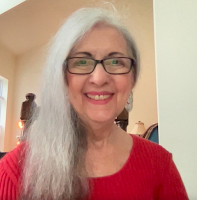 MaryAnn Diorio writes riveting fiction from a small, quaint Victorian town in southern New Jersey where the neighbors still stop to chat while walking their dogs, the houses still sport wide, wrap-around front porches, and the charming downtown still finds kids licking lollipops and old married couples holding hands.
MaryAnn Diorio writes riveting fiction from a small, quaint Victorian town in southern New Jersey where the neighbors still stop to chat while walking their dogs, the houses still sport wide, wrap-around front porches, and the charming downtown still finds kids licking lollipops and old married couples holding hands.A true Jersey girl, MaryAnn is a big fan of Jersey diners, Jersey tomatoes, and the Jersey shore. You can learn more about MaryAnn at maryanndiorio.com.
Featured Image: Photo by Kae Ng on Unsplash
Published on July 28, 2022 22:00
July 27, 2022
Be a Giver

by Henry Mclaughlin @RiverBendSagas
Giving is one of the clearest concepts in the Bible. The Word of God goes so far as to tell us to give cheerfully because the Lord loves a cheerful giver. So, our attitude is important. As Christians, one of our assignments is to help others. The specific form of helping can take very specific aspects. Overall, they fall into three general areas: finances, time, and talent. Sometimes all three are involved at once.
I think we’ve all heard of giving tithes and offerings to our church. This is an awesome place to start. Some of us also give to other organizations like the Red Cross. Have you ever given money to an individual? When I was struck down by Covid, my men’s group took up a substantial financial gift for us. While I was home with Covid, my wife was in the hospital with Covid pneumonia. Our neighbors made sure I was fed, picked food and medication for me, and transported my wife home from the hospital.
There have been times when the Lord has nudged and encouraged my wife and I to give money to individuals. We try to follow as he leads. The amount varies but the impetus is clearly from the Lord.
I remember a time my wife and I went to Home Depot. We pulled into the parking lot. A couple with a couple of children were sitting on one of the little islands that dot the parking area. There was a small tree providing the only shade. They held a cardboard sign requesting help. I don’t recall the exact wording. We went into the store and as we shopped, my wife told me she felt the Lord telling her to give the family some money. We finished our shopping. When we left, the family was gone. We missed our opportunity to obey God and bless someone. Our prayer was someone else blessed them. We’ll never know this side of heaven, but missing that opportunity stirred in us a stronger desire to follow God’s promptings more quickly with his discernment guiding us as to the person and the amount.
Whenever we volunteer to serve, whether at church or a community organization, we make a gift of our time. The value of time is once you give, you can’t get it back. We all have an allotted amount of time in this life. How we use it is up to us. We can bless others, we can waste it, or we can use it for selfish purposes. We can increase our finances and develop our talents, but we can’t get more time.
The other aspect of giving our time is we are simply in that place of service to give to others. It might be to sit with a grieving family. It might be cleaning the bathrooms at church or the house of an elderly person. It might be volunteering in a church or school program so single moms can have a break for a few hours. Our church has a group called the Men’s Brigade. These guys go out on weekend to do repairs and such for the widows and single moms.
Giving our time to be available to others in whatever way is a blessing to them and a blessing to ourselves as we are rewarded for our efforts even if no one else notices.
Talents is the third area. The Lord leads me to help other writers with the gifts he’s given me. He’s also placed in my wife and I a desire to help others manage their finances. We’ve learned a lot the hard way and he led us to share what we’ve learned through our church by coaching individuals and families is such things as making a budget, devising a plan to get out of debt, and developing confidence in their ability to handle money wisely.
These are just a few examples of being a giver.
What are some of the things you’re doing to give to others?
TWEETABLEBe a Giver - thoughts from author Henry McLaughlin, @RiverBendSagas on @EdieMelson (Click to Tweet)
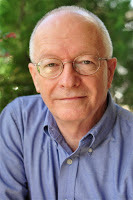 Henry’s debut novel, Journey to Riverbend, won the 2009 Operation First Novel contest.
Henry’s debut novel, Journey to Riverbend, won the 2009 Operation First Novel contest.Henry edits novels, leads critique groups, and teaches at conferences and workshops. He enjoys mentoring and coaching individual writers.
Connect with Henry on his BLOG, TWITTER and FACEBOOK.
Fun Image to Share on Pinterest

Featured Image: Photo by Jon Tyson on Unsplash
Published on July 27, 2022 22:00
July 26, 2022
Why Keeping Your Writer Profile Up to Date is Important to Reaching Your Audience
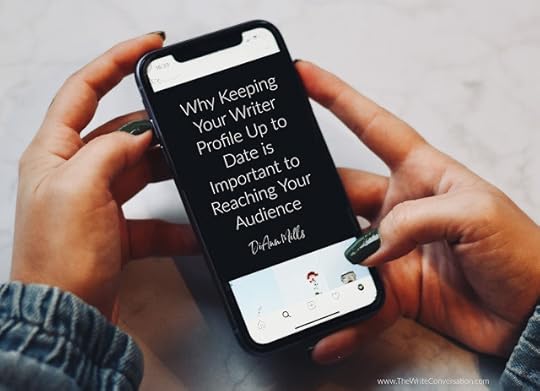
by DiAnn Mills @DiAnnMills
Writers create worlds out of words, and yet updating our profile can paralyze us. A professional writer creates a profile that demonstrates ingenuity and imagination. It reflects the writer’s voice and genre in fresh uniqueness. Writers long for their profiles to never be forgotten—it’s our brand, an unforgettable silhouette, and our presence in the publishing industry.
Often writers define a profile as their headshot, but the reader needs more than a face. Who is this writer? What does he/she write? Where does he/she live? Why is the writer inspired to create in a particular genre? How can the writer be contacted? Is the writer approachable? Special interests? Extra info? Every detail needs a regular review.
If our bio, brand, photo, tagline, website, and social media platforms are solid, why do we want to tamper with perfection?
Places to Update Your Writer Profile
Bio
A writer’s bio is a summary of the person’s expertise, knowledge, personal information, and professional standing. Don’t forget an additive that shows we are approachable, fun, or a little quirky. This endears the reader to us.
Create bios of different lengths for different audiences/placement: one sentence, one paragraph, two paragraphs, and no more than one page single-spaced.
Brand
A writer’s brand is who we are in the publishing industry. Through our profile, a reader knows our style or genre. We are known by our brand, and if the writer doesn’t establish how he/she wants to be known, the publishing world will do it for us, and the result might not be what we value.
A bestselling writer’s name is often the brand: Jerry Jenkins, John Grisham, or David Baldacci.
Photo
A professional photographer is best. Some writers change their photos every six months or less. That habit can be expensive. Yet photos taken at special events are a perk for our readers. Some writers use the same photo for ten years. The problem with the length of time between photographs is we no longer looks the same. That could be embarrassing.
A recommendation is to replace photos every three to four years unless significant changes in appearance warrant replacing sooner. If the writer chooses a different pose for social media platforms, make sure the photo has similarities. That way there is no doubt about who is represented.
Tagline
A writer’s tagline exemplifies the writer’s focus, not an individual book or series. This represents and is part of a writer’s brand. At times the brand and the tagline are the same. I’ve had the same tagline for years and have no intentions of changing. But a writer who switches to a new genre or nonfiction may find it necessary to create a new tagline.
Website
A website is the writer’s calling card. Ensure it is professional. Websites need a refresh or redo every three to max four years. A good rule is when a photo is updated, that’s a clue to take a hard look at the website. Is it antiquated? Is the website magnetic or a deterrent?
Website updates are constant: new book releases, removal of old events, and interesting updates that keep the reader returning.
Social Media
Each social media platform has a personality geared to attract readers with unique and branded content. The bio for each social media platform is worded differently to reflect the specific interest. Additional information targets the social media platform’s focus.
Writers want to share their passion with others, and the best way is to keep our info current.
What are you doing to keep your writing profile updated?
TWEETABLEWhy Keeping Your Writer Profile Up to Date is Important to Reaching Your Audience, tips from @DiAnnMills on @EdieMelson (Click to Tweet)
 DiAnn Mills is a bestselling author who believes her readers should expect an adventure. She creates action-packed, suspense-filled novels to thrill readers. Her titles have appeared on the CBA and ECPA bestseller lists; won two Christy Awards; and been finalists for the RITA, Daphne Du Maurier, Inspirational Readers’ Choice, and Carol award contests.
DiAnn Mills is a bestselling author who believes her readers should expect an adventure. She creates action-packed, suspense-filled novels to thrill readers. Her titles have appeared on the CBA and ECPA bestseller lists; won two Christy Awards; and been finalists for the RITA, Daphne Du Maurier, Inspirational Readers’ Choice, and Carol award contests. She is the former director of the Blue Ridge Mountain Christian Writers Conference, Mountainside Marketing Retreat, and Mountainside Novelist Retreat with social media specialist Edie Melson. Connect here: DiAnnMills.com
Share This Image on Pinterest!
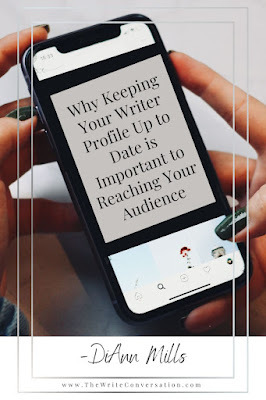
Published on July 26, 2022 22:00
July 25, 2022
Dipping The Quill Deeper—Words and Writings Part II

by Eva Marie Everson
In my last blog post, I took a look at the writing of William Barclay, in particular his work titled Prayers for the Christian Year, which includes a heart-stirring poem/prayer thanking God for “words and writings” and those who speak and write them.
In that blog, we took individual lines from the first part of the prayer and broke them apart, delving deeper into what those words reflected. Now I’d like to do the same with a small portion from the second part of the prayer.
Grant, O God, that we may never listen to any teaching which would encourage us to thinksin less serious, vice more attractive,or virtue less important.
I recently spent about a week on what I call “the COVID couch.” Meaning, with what truly was a light case of Omicron that left me quite fatigued than much else, I found myself on the sofa watching more television than usual. Much more. I also discovered—or rediscovered—why I don’t watch a lot of the current shows. They’re just awful! So, I scanned apps like Pluto and Amazon Prime for “Classic TV,” so that my sensibilities wouldn’t be tested but also so that if I fell asleep . . . well, I kinda know what happened next.
But even here, where the shows when they aired in the 1950s and 1960s featured advertisements for dishwashing liquid or toothpaste, I found myself slapped nearly senseless with commercials that advertised sin. Not my definition of sin—God’s definition of sin.
Somehow, someway, we’ve become a world not too far from the “days of Noah” (Luke 17: 26-27). After quite enough of this, I declared to my husband that I wouldn’t even want to think about trying to rear children in today’s society. Have we forgotten the mandates that God set for relationships—with Him and with others? What about for marriage? And now we teach them to our children, our innocent precious gifts from God Himself whom Jesus warned us fervently against hurting (Matthew 18:6).
We have begun to think sin less serious, vice more attractive, and virtue less important.
But perhaps we can counter that with our prayers. We can place the names of our children, our grandchildren, our neighbor’s children, our nieces and nephews, our nation, our world and surely ourselves within the context of the prayer.
Grant, O God, that [my child, my grandchild, I …] may never listen to any teaching which would encourage [him/her/me] to thinksin less serious, vice more attractive,or virtue less important.
What might happen, I wonder if we were to speak those words, pray those words to be more specific, to a God who is greater than anything the world can throw at us.
At them.
What might happen if we, as writers, take up our pens with a new mission, one that counteracts what the world is saying? What if, after we sit down at our desks or kitchen tables or in our favorite chairs, we were to pray a new prayer.
Grant, O God, that [I] may never [write] any teaching which would encourage [others] to thinksin less serious, vice more attractive,or virtue less important.
How might our words—both spoken and written—begin to change things?
We know that the “days of Noah” will return. We know that things must go from bad to worse and then to worst before we see our Messiah, our Savior, return for us. But what if we can change nothing more than the lives of the world around us? Our families. Our neighborhoods. The lives of our readers.
And what, if NASA could show our “light,” which is reflective of His light, might that look like from the International Space Station?
I wonder . . .
[To be continued. . .]
TWEETABLEDipping the Quill Deeper—Words and Writings, Part II from author Eva Marie Everson on @EdieMelson (Click to Tweet)
Don't Miss the Other Posts in This SeriesDipping the Quill Deeper—Words and Writings, Part IDipping the Quill Deeper—Words and Writings, Part II
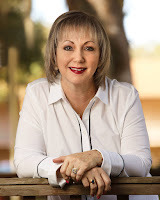 Eva Marie Everson is the president of Word Weavers International, the director of Florida Christian Writers Conference, and the contest director for Blue Ridge Mountains Christian Writers Conference. She is the multiple award-winning author of 40 books and countless articles and blogposts. She is also an award-winning speaker and a Bible teacher. Eva Marie is often seen at writers conferences across the States. She served as a mentor for the Jerry B. Jenkins Christian Writers Guild and taught as a guest professor at Taylor University in 2011. She and her husband make their home in Central Florida where they enjoy their grandchildren. They are owned by one persnickety cat.
Eva Marie Everson is the president of Word Weavers International, the director of Florida Christian Writers Conference, and the contest director for Blue Ridge Mountains Christian Writers Conference. She is the multiple award-winning author of 40 books and countless articles and blogposts. She is also an award-winning speaker and a Bible teacher. Eva Marie is often seen at writers conferences across the States. She served as a mentor for the Jerry B. Jenkins Christian Writers Guild and taught as a guest professor at Taylor University in 2011. She and her husband make their home in Central Florida where they enjoy their grandchildren. They are owned by one persnickety cat.
Published on July 25, 2022 22:00



